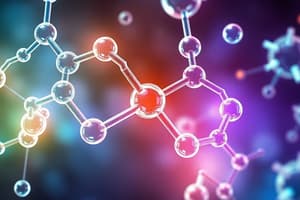Podcast
Questions and Answers
What was the limitation of the first schistosomicides introduced, antimonials?
What was the limitation of the first schistosomicides introduced, antimonials?
- High cost for treatment
- Convenient mode of administration
- Toxicity (correct)
- Short treatment courses
What is the essential group in Niridazole for its activity against all species of schistosome?
What is the essential group in Niridazole for its activity against all species of schistosome?
- NH2
- Cl
- SO2
- Nitro (correct)
Why is Niridazole not suitable for use as prophylaxis?
Why is Niridazole not suitable for use as prophylaxis?
- Low availability
- CNS efficacy
- CNS toxicity (correct)
- High cost
Which of the following is true about Thioxanthones like lucanthone and hycanthone?
Which of the following is true about Thioxanthones like lucanthone and hycanthone?
What causes a loss of activity in Niridazole?
What causes a loss of activity in Niridazole?
What is the significance of introducing two amidine groups for high activity in trypanocides?
What is the significance of introducing two amidine groups for high activity in trypanocides?
Which structural modification leads to compounds of reduced activity in trypanocides?
Which structural modification leads to compounds of reduced activity in trypanocides?
What distinguishes nitrofurans like Nifurtimox in terms of their properties?
What distinguishes nitrofurans like Nifurtimox in terms of their properties?
What action do organic arsenicals exhibit on trypanosomes?
What action do organic arsenicals exhibit on trypanosomes?
What makes Melarsoprol effective against meningoencephalitic associated with late stages of T. gambiense and T. rhodesiense?
What makes Melarsoprol effective against meningoencephalitic associated with late stages of T. gambiense and T. rhodesiense?
What is the drug of choice for acute Chagas disease caused by T. cruzi?
What is the drug of choice for acute Chagas disease caused by T. cruzi?
What is the major setback in the application of melarsoprol as a trypanocidal agent?
What is the major setback in the application of melarsoprol as a trypanocidal agent?
Which antidote is used to counteract the toxic effects of arsenic in cases of poisoning?
Which antidote is used to counteract the toxic effects of arsenic in cases of poisoning?
Which parasitic worm disease is also known as Bilharziasis?
Which parasitic worm disease is also known as Bilharziasis?
What are the three major species of schistosomes that infect humans?
What are the three major species of schistosomes that infect humans?
What is an ideal quality expected from an anti-schistosomal agent?
What is an ideal quality expected from an anti-schistosomal agent?
Which class of anti-schistosomal agents includes antimonials?
Which class of anti-schistosomal agents includes antimonials?
Flashcards are hidden until you start studying
Study Notes
Structure-Activity Relationship (SAR)
- The dimethyl derivative of stilbamidine is twice as active as stilbamidine itself
- Introduction of –NH, –CH3CO–NH, or alkoxy groups leads to a decrease in activity
- Two amidine groups are essential for high activity and must be attached directly to the aromatic nuclei
Trypanocidal Agents
- Introduction of a heterocyclic ring between two aromatic benzene nuclei gives a powerful trypanocidal activity
- Replacement of the benzene ring with other nuclei results in compounds with reduced activity
- Diamidinophenanthrene, formed through ring closure, exhibits only small trypanocidal activity
Nitrofurans
- Derivatives of 5-nitro-2-furaldehyde possess antiprotozoal activity in addition to antibacterial properties
- Nifurtimox is the drug of choice for acute Chagas disease caused by T. cruzi
Organic Arsenicals
- Melarsoprol (Arsobal) is a trivalent arsenical compound with antisyphilic and trypanocidal properties
- It penetrates the CNS and is effective against meningoencephalitic associated with the late stages of T. gambiense and T. rhodesiense infection
- Adverse reactions include potentially fatal reactive encephalopathy, and the antidote is dimercaprol
Antischistosomal Agents
- Schistosomiasis, also known as Bilharziasis, is a severe, debilitating, parasitic worm disease affecting about 200 million people worldwide
- The three major species infecting humans are Schistosoma haematobium, Schistosoma mansoni, and Schistosoma japonicum
Life Cycle and Host-Vector Control
- Cercariae penetrate the skin of humans, causing infection
- Symptoms include blood in urine, liver and spleen enlargement, and diarrhea
- Host-vector control involves the use of molluscicides against snails and provision of clean water supply
Chemotherapy
- An ideal anti-schistosomal agent should have absence of side effects and toxicity in humans, high activity against the three major species of schistosomes, and be effective after single or one-day treatment
- Classes of anti-schistosomal agents include antimonials, thioxanthones, nitrothiazoles, oxamniquine, and praziquantel
Antimonials and Thioxanthones
- Antimonials were the first schistosomicides introduced, but were severely limited by their toxicity and inconvenient mode of administration
- Thioxanthones, such as lucanthone and hycanthone, are examples of anti-schistosomal agents
Niridazole
- Niridazole was discovered by Lambert and co-workers in 1964 and is active against all species of schistosomes
- The nitro group is essential for its activity, and replacement with Cl, SO2, NH2, or H causes a loss of activity
- Niridazole is metabolized too quickly in low doses to be used as prophylaxis and is limited by CNS toxicity and lack of efficacy against S. japonicum
Studying That Suits You
Use AI to generate personalized quizzes and flashcards to suit your learning preferences.




